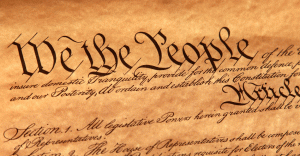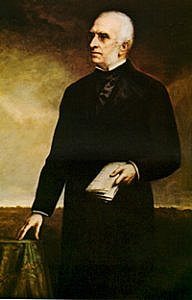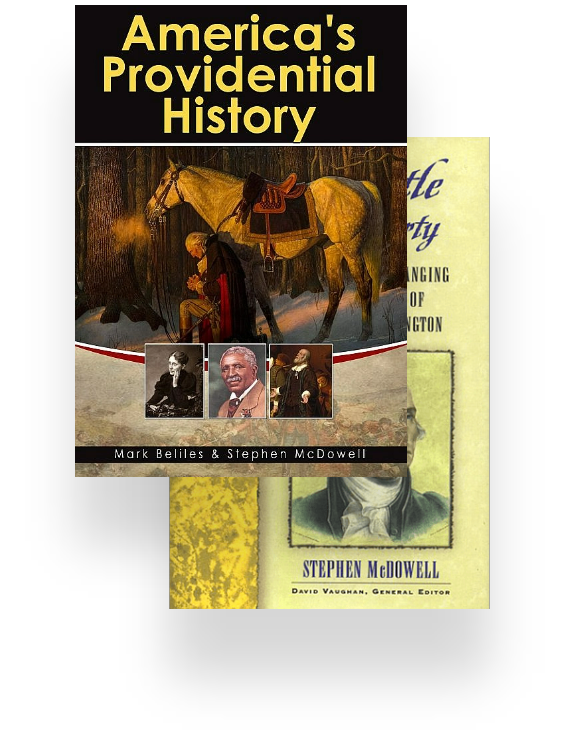PF UNIVERSITY


The Founders saw man from a Christian perspective; that is, man is sinful and in a fallen state. As such, they were careful to construct a form of government that would not entrust man with too much power, knowing that sinful man will tend to abuse power. John Adams wrote:
To expect self-denial from men, when they have a majority in their favor, and consequently power to gratify themselves, is to disbelieve all history and universal experience; it is to disbelieve Revelation and the Word of God, which informs us, the heart is deceitful above all things, and desperately wicked…. There is no man so blind as not to see, that to talk of founding a government upon a supposition that nations and great bodies of men, left to themselves, will practice a course of self-denial, is either to babble like a new-born infant, or to deceive like an unprincipled impostor.[i]
James Madison said, in Federalist No. 51, “What is government itself but the greatest of all reflections on human nature? If men were angels, no government would be necessary. In framing a government which is to be administered by men over men, the great difficulty lies in this: you must first enable the government to control the governed; and in the next place oblige it to control itself.”[ii] The Founders’ view of human nature profoundly affected their view of government. The Constitution they formed limited the power of our rulers in various ways: binding them down with a constitution; holding them accountable with frequent elections; dividing the legislative, executive, and judicial powers; and setting up checks and balances within these separate governing bodies.
The Constitution contains many biblical ideas, some of which follow:
America’s civil government is a government of laws, not of rulers. Throughout most of history people have been governed by laws imposed by their rulers. In America, for the first time ever, the people formed their own Constitution and consented to it. They established a government of people’s law, not of ruler’s law. The law they established was based on Biblical truth, which is essential for protecting the individual’s right to life, liberty, and property. Citizens must not only be protected from harmful acts of other citizens but also from abuses by their own government. Since the law is supreme and not the rulers, the people will be protected from ruler’s tyranny, as everyone — ruler and subject — is subject to the law.
In a nation under law, any violation of the law requires a judge. Wrongdoers must be punished and required to make restitution to deter crime, yet, there must be an orderly process of justice where the guilty and innocent are distinguished. The Bible requires judges “to be honest, to refuse bribes, and not to show favoritism (Ex. 23:1-8). A person was presumed innocent unless at least two witnesses testified against him (Deut. 17:6), and the penalty for perjury was severe (Deut. 19:16-21).”[iii]
The United States Constitution provides numerous protections for persons accused of crimes. Many of these rights are contained in Amendments 4, 5, 6, and 7 of the Constitution. These rights are derived from the idea that since man is created in the image of God, his life has great value and should be guarded with care.
Since man is created in the image of God, man has an inherent value and dignity. God has endowed certain rights to His valuable creation that He expects all peoples and governments to recognize. The commands of Scripture reveal God has given man the right to life, liberty, and property:
According to the Declaration of Independence, men’s rights are “endowed by their Creator…. That to secure, these rights, Governments are instituted among men.”
For a nation to be free from the tyranny of centralized government, each individual citizen must be self-governing. The Bible and history reveal that if men do not govern themselves under God, then others will rule over them, and those rulers will eventually become tyrants. William Penn said, “Men must be governed by God or they will be ruled by tyrants.”
Robert C. Winthrop, speaker of the U.S. House of Representatives from 1847-1849, recognized the necessity of individual self-government for the functioning of the American Republic. He said:

All societies of men must be governed in some way or other. The less they may have of stringent State Government, the more they must have of individual self-government. The less they rely on public law or physical force, the more they must rely on private moral restraint. Men, in a word, must necessarily be controlled either by a power within them, or by a power without them; either by the Word of God, or by the strong arm of man; either by the Bible or the bayonet.[iv]
As Americans have become less self-governed, our civil government has grown larger and larger and become more centralized. The more centralized a civil government becomes, the more loss of individual liberty will occur.
The First Amendment guarantees the right of citizens to freely worship God without fear of the national government interfering or forcing people to adhere to a certain religious belief. While this keeps the state out of the church, it in no way removes God from government. It is impossible to remove God from government; every civil government operates on some religion. America was founded on the Christian religion but in recent years has been shifting to a man-centered, humanistic religion.
Private property rights are a basic necessity for any society that desires to be free and prosperous. The founders of America acknowledged this truth and the Constitution protects property rights of individuals. Noah Webster wrote:
Let the people have property and they will have power – a power that will forever be exerted to prevent a restriction of the press, and abolition of trial by jury, or the abridgement of any other privilege.[v]
The private property rights found in Amendment 5 and other places in the Constitution flowed out of the understanding by our Founders of the internal aspect of private property rights. James Madison, the chief architect of the Constitution, wrote:
Property… In the former sense, a man’s land, or merchandise, or money, is called his property. In the latter sense, a man has a property in his opinions and the free communication of them. He has a property of peculiar value in his religious opinions, and in the profession and practice dictated by them…. He has an equal property in the free use of his faculties, and free choice of the objects on which to employ them. In a word, as a man is said to have a right to his property, he may be equally said to have a property in his rights.[vi]
The Founders believed that God created everything, including us, and given us the right to possess property, both internal (opinions, ideas, talents, etc.) and external (land, merchandise, money, etc.). The Declaration of Independence acknowledges this right is endowed by God; the Constitution secures this God-given right.
The United States of America is an example of a Christian union. The original external union among the states was the result of an internal unity of ideas and principles in the hearts of the people. This voluntary working together or covenanting together is the basis of Christian union. America’s motto, E Pluribus Unum (“from many, one”), expresses this unity with union.
While the United States reveals a Christian union, the former Soviet Union was an example of a non-biblical union. External force and fear was used to hold all the people groups together. It was an involuntary union and, hence, did not last. In America, unity brings union; in the USSR, the union attempted to force unity.
Stronger internal bonds will produce a stronger union and action. If the original colonies had never formed a union, they would have never individually made the positive impact upon the world that corporately the United States has been able to make. In fact, they might not ever have survived.
The American people established the Constitution to “provide for the common defense.” Congress was given specific powers to accomplish this function of civil government. The Second Amendment to the Constitution recognizes “a well-regulated militia” is “necessary to the security of a free state,” and therefore secures “the right of the people to keep and bear arms.” This right of defense comes from the Biblical idea of man. Since we are God’s property and He requires us to be good stewards, we have a responsibility to preserve our lives. It follows that we have a right to defend our persons and families against those who may try to harm us. We establish police forces to help defend our life, liberty, and property from evildoers within our nation. State and national armies are established to defend citizens from aggressive nations.
Our Founders understood that a nation can only have liberty and peace through strength. Consider some of their remarks:
In addition to the Constitution containing many ideas that are Christian, its form or framework also reflects Biblical ideas. A few of these are:
The United States Constitution secures for each state a republican form of government (Art. 4, Sec 4). One characteristic of a republic is that the people choose representatives to stand in their place in the seat of government.
The principle of self-government reveals to us the right of each individual to participate in government. The people, under God, are the source of power for governments. Therefore, a Biblical civil government will be democratic in nature. A true democracy, however, has a number of shortcomings. In a democracy, just over 50% of the people rule. If they desire to abuse the individual rights of the minority they can. Hence, a democracy tends to majority tyranny.
A democracy also requires direct participation by citizens in all government matters, which is impractical. Individuals choosing their representatives allows participation in government in every situation.
Representative government had its origin in the Hebrew nation. Moses told the people to “choose wise and discerning and experienced men [‘able men who fear God, men of truth, those who hate dishonest gain’] and I will appoint them as … heads over you, leaders of thousands, and of hundreds, of fifties and of tens, and officers for your tribes.” (Deuteronomy 1:13-17; Exodus 18:21-27)
Noah Webster revealed the importance of being involved in choosing your representatives:
When you become entitled to exercise the right of voting for public officers, let it be impressed on your mind that God commands you to choose for rulers, “just men who will rule in the fear of God.” The preservation of a republican government depends on the faithful discharge of this duty; if the citizens neglect their duty and place unprincipled men in office, the government will soon be corrupted; laws will be made, not for the public good, so much as for selfish or local purposes; corrupt or incompetent men will be appointed to execute the laws; the public revenues will be squandered on unworthy men; and the rights of the citizens will be violated or disregarded. If a republican government fails to secure public prosperity and happiness, it must be because the citizens neglect the divine commands, and elect bad men to make and administer the laws.[xi]
America’s national government is divided into three branches with an intricate system of checks and balances. This division is based upon the Biblical idea that mankind is sinful and in a fallen state. While man is capable of some civic virtue, he also is self-centered and must be limited and checked in the power he exercises. If rulers are given too much power, they will abuse it for their gain and their subjects’ harm. James Madison affirmed in Federalist No. 51 (see his quote above) the need to balance power between the governed and the governing.
Every government has three basic functions: 1. Legislative – making laws; 2. Executive – enforcing laws’ 3. Judicial – interpreting laws. The Bible speaks of these three governmental functions in the Godhead (Isaiah 33:22). God, being perfect, can administer all three; with man it should be otherwise.
In his book Spirit of Laws (1748), Montesquieu said that these three functions of government must be separated to prevent tyranny. The founders of America studied his writings and agreed with his assessment. Madison wrote: “The accumulation of all powers, legislative, executive, and judiciary, in the same hands, whether of one, a few, or many…may justly be pronounced the very definition of tyranny.”[xii] This is why the Founders separated the powers of government into three branches and set up checks and balances between the branches.
The tenth amendment to the Constitution states the idea of federalism: “The powers not delegated to the United States by the Constitution, nor prohibited by it to the States, are reserved to the States respectively, or to the people.” The basic idea was to get government as close to the people as possible. The more remote it is from the people, the more dangerous it becomes. Jefferson said:
The way to have good and safe government is not to trust it all to one, but to divide it among the many;…it is by dividing and subdividing these republics, from the great national one down…that all will be done for the best.[xiii]
James Madison explained: “The powers delegated by the…Constitution to the federal government are few and defined. Those which are to remain in the State governments are numerous and indefinite.”[xiv]
In the federal republic established by the Constitution, most powers rested with the state and local governments. The Constitution establishes only 18 powers in the national government in Article 1, Section 8, and declares these powers off-limits to the states in Section 10. All other powers rest with the states and people. The national government can only make laws dealing with such items as the regulation of interstate and foreign commerce, coining money, the postal services, copyrights, citizenship laws, and the armed forces. The state governments can only make laws dealing with such things as public education, voting procedures, marriage and divorce, corporations and traffic. Neither can interfere in the area of the other without being unconstitutional.
In recent years the national government has ballooned in growth, disrupting the balance of powers between the national and state and local governments. Greater centralization of power has come as individuals have failed to govern themselves on a local level.
The Declaration of Independence and the U.S. Constitution were clearly founded upon Christian ideas of man and government. Our Founders were the first men to “hold these truths” and establish a nation upon them. Without Christianity, there never would have been a Constitution. As Noah Webster, the father of the dictionary and a key Federalist in the passage of the Constitution, said:
The religion which has introduced civil liberty, is the religion of Christ and his apostles, which enjoins humility, piety, and benevolence; which acknowledges in every person a brother, or a sister, and a citizen with equal rights. This is genuine Christianity, and to this we owe our free constitutions of government.[xv]
[i] John Adams, The Works of John Adams, Charles Francis Adams, editor (Boston: Little, Brown & Co., 1856), Vol. 6, A Defense of the Constitutions of Government of the United States of America, “Chapter First. Marchamont Nedham. The Right Constitution of a Commonwealth Examined.”
[ii] James Madison, Federalist 51, The Federalist, a Collection of Essays, Written in Favor of the Constitution of the United States, a Agreed Upon by the Federal Convention, September 17, 1787, by Alexander Hamilton, John Jay, and James Madison, Jr., edited by Michael Loyd Chadwick, Washington, DC: Global Affairs Publishing Co., 1987, p. 281.
[iii] John Eidsmoe, Christianity and the Constitution, Grand Rapids, MI: Baker Book House, 1987, p. 374.
[iv] Robert C. Winthrop, “Address to Massachusetts Bible Society Meeting, May 28, 1849,” Addresses and Speeches on Various Occasions, Boston: Little, Brown & Co., 1852, p. 172.
[v] Rosalie J. Slater, “Noah Webster, Founding Father of American Scholarship and Education,” preface article in reprint of An American Dictionary of the English Language (1828) by Noah Webster, San Francisco: Foundation for American Christian Education, 1980, p. 14.
[vi] Verna Hall, The Christian History of the Constitution of the United States, Christian Self-government, San Francisco: Foundation for American Christian Education, 1980, p. 248A.
[vii] Our Ageless Constitution, W. David Stedman, editor, Asheboro, NC: Stedman Associates, 1987, p. 39.
[viii] Ibid.
[ix] Ibid.
[x] Ibid.
[xi] Noah Webster, History of the United States, New Haven: Durrie & Peck, 1833, pp. 307-308.
[xii] The Federalist by Hamilton, Jay, & Madison, Washington, D.C.: Global Affairs Publ., 1987, no. 47.3, p. 260-261.
[xiii] Our Ageless Constitution, p. 32.
[xiv] The Federalist, no. 45, p. 252.
[xv] Noah Webster, History of the United States, New Haven: Durrie & Peck, 1833, pp. 273-274.
PF UNIVERSITY
The courses offered by the Providence Foundation Biblical Worldview University (BWU) are designed to equip leaders of education, business, and politics to transform their culture for Christ, and to train all citizens how to disciple nations.
DONATE
Support Providence Foundation today! Choose Minuteman, Patriot, or Founder level and make a monthly impact. Or select ‘Custom’ to contribute now. Join us in shaping our nation’s future
